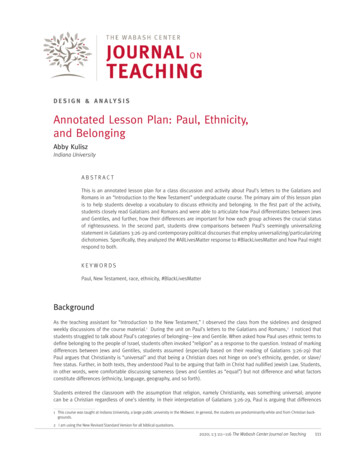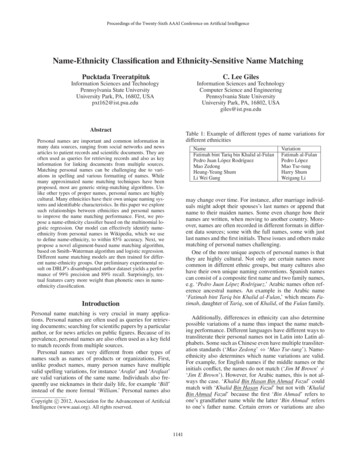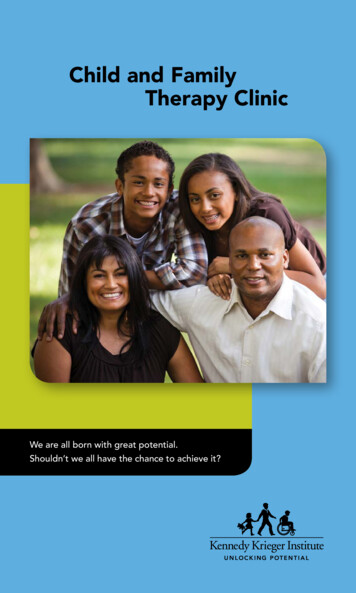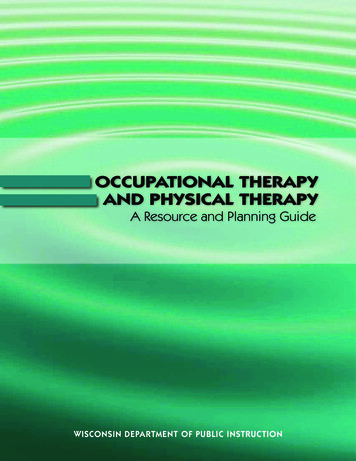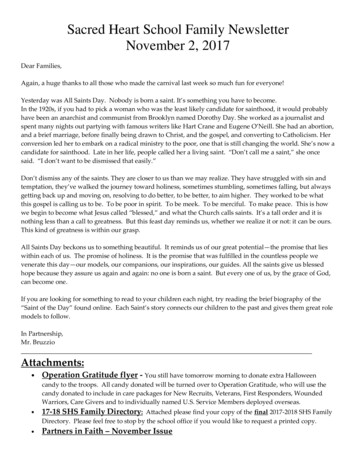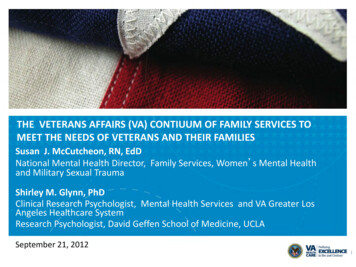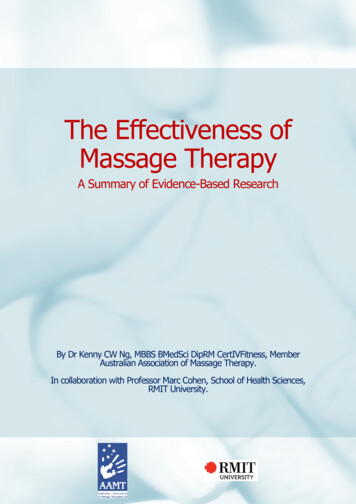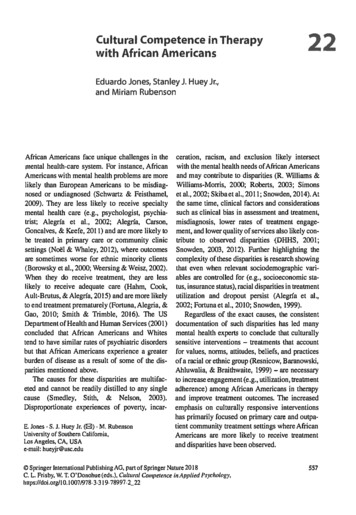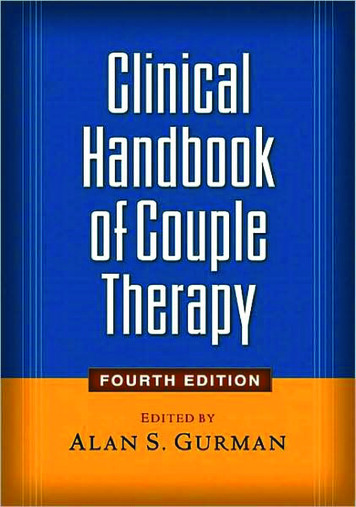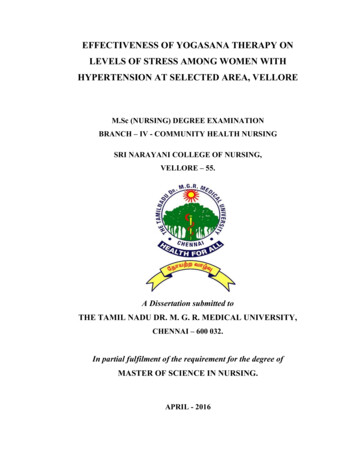
Transcription
ETHNICITY AND FAMILY THERAPYwww.ebook3000.com
www.ebook3000.com
Ethnicity& FamilyTherapyTHIRD EDITIONedited byMonica McGoldrickJoe GiordanoNydia Garcia-PretoTHE GUILFORD PRESSNew YorkLondonwww.ebook3000.com
2005 Monica McGoldrick, Joe Giordano, and Nydia Garcia-PretoPublished by The Guilford PressA Division of Guilford Publications, Inc.72 Spring Street, New York, NY 10012www.guilford.comAll rights reservedNo part of this book may be reproduced, translated, stored in a retrieval system, or transmitted,in any form or by any means, electronic, mechanical, photocopying, microfilming, recording, orotherwise, without written permission from the Publisher.Printed in the United States of AmericaThis book is printed on acid-free paper.Last digit is print number:987654321Library of Congress Cataloging-in-Publication DataEthnicity and family therapy / edited by Monica McGoldrick, Joe Giordano, Nydia GarciaPreto.—3rd ed.p. cm.Includes bibliographical references and index.ISBN 1-59385-020-4 (hardcover)1. Minorities—Mental health services—United States. 2. Family psychotherapy—UnitedStates. 3. Minorities—United States—Family relationships. I. McGoldrick, Monica.II. Giordano, Joseph. III. Garcia-Preto, Nydia.RC451.5.A2E83 2005362.2′ 089′ 00973—dc222004029338www.ebook3000.com
To the memory of Evelyn Lee, EdD, LCSW (1944–2003)Friend, colleague, author, trainer,community worker, researcherAn inspiration to so many of usin doing work to build cultural bridgeswww.ebook3000.com
www.ebook3000.com
About the EditorsMonica McGoldrick, LCSW, PhD (h.c.), Director of the Multicultural Family Institute inHighland Park, New Jersey, is also Associate Professor of Clinical Psychiatry at the Universityof Medicine and Dentistry of New Jersey–Robert Wood Johnson Medical School. She servedas Visiting Professor at Fordham University School of Social Service for 12 years. Ms.McGoldrick received her MSW in 1969 from Smith College School for Social Work, whichlater granted her one of the few honorary doctorates awarded by the school in its 60-year history. She has also received many other awards, including the American Family Therapy Academy’s award for Distinguished Contribution to Family Therapy Theory and Practice. Knowninternationally for her many books, she has spoken widely on a variety of topics, includingculture, class, gender, the family life cycle, loss, genograms, remarried families, and siblingrelationships.Joe Giordano, MSW, is a family therapist in private practice in Bronxville, New York. He wasformerly Director of the American Jewish Committee’s Center on Ethnicity, Behavior, andCommunications, where he conducted pioneering studies on the psychological nature of ethnic identity and group behavior. Widely published, his articles on ethnicity, family, and themedia have appeared in national magazines and newspapers. Mr. Giordano also served ashost of Proud to Be Me, a PBS television program for adolescents on race and ethnic identity,and as producer of the audio series Growing Up in America.Nydia Garcia-Preto, LCSW, is cofounder and Clinical Director of the Multicultural FamilyInstitute, where she serves on the faculty and has a private practice. She has served as VisitingProfessor at the Rutgers Graduate School of Social Work and as Director of the AdolescentDay Hospital at the University of Medicine and Dentistry of New Jersey. A noted family therapist, author, teacher, and lecturer, Ms. Garcia-Preto has published in textbooks and journalsand has presented nationally on Puerto Rican and Latino families, Latinas, ethnic intermarriage, and families with adolescents. She is a highly respected trainer in the areas of culturalcompetence and organizational team building.viiwww.ebook3000.com
www.ebook3000.com
ContributorsNuha Abudabbeh, PhD, NAIM Foundation, Washington, DCAnna M. Agathangelou, PhD, Department of Political Science, York University, Toronto,Ontario, CanadaRhea Almeida, PhD, LCSW, Institute for Family Services, Somerset, New Jersey; MulticulturalFamily Institute, Highland Park, New JerseyZarita Araújo-Lane, MSW, LCSW, Cross Cultural Communication Systems, Inc., Winchester,MassachusettsGuillermo Bernal, PhD, University Center for Psychological Services and Research andDepartment of Psychology, University of Puerto Rico, Rio Piedras, Puerto RicoLascelles Black, MSW, private practice, New Rochelle, New York, and New York, New YorkJames K. Boehnlein, MD, Department of Psychiatry, Oregon Health and Science University,Portland, OregonNancy Boyd-Franklin, PhD, Graduate School of Psychology, Rutgers, The State University ofNew Jersey, Piscataway, New JerseyJanet R. Brice-Baker, PhD, Department of Psychology, Yeshiva University, Bronx, New YorkMary Anne Broken Nose, BA, COPSA Institute for Alzheimer’s Disease and Related Disorders,University of Medicine and Dentistry of New Jersey–University Behavioral HealthCare,Piscataway, New JerseySteve Dagirmanjian, PhD, Catskill Family Institute, Kingston, New YorkSean D. Davis, PhD, Marriage and Family Therapy Program, Department of Family Studies,University of Kentucky, Lexington, KentuckyConrad De Master, LCSW, private practice, Waldwick, New JerseyAnn Del Vecchio, PhD, Alpha Assessment Associates, Albuquerque, New MexicoJenny Duncan-Rojano, MS, LCSW, School-Based Centers, Hartford Public Schools, Hartford,ConnecticutBeth M. Erickson, PhD, Erickson Consulting, Edina, Minnesota, and Ramsey, Minnesotaixwww.ebook3000.com
x ﲄ ContributorsCelia Jaes Falicov, PhD, Department of Psychiatry, University of California, San Diego, SanDiego, CaliforniaJohn Folwarski, LCSW, Raritan Bay Mental Health Center, Perth Amboy, New JerseyNydia Garcia-Preto, LCSW, Multicultural Family Institute, Highland Park, New JerseyRita Mae Gazarik, LCSW, private practice, New York, New York; Columbia University Schoolof Social Work, New York, New York; Hunter College School of Social Work, City Universityof New York, New York, New YorkJoe Giordano, MSW, private practice, Bronxville, New YorkMaryAnn Dros Giordano, MSW, private practice, Bronxville, New YorkKaren L. Haboush, PsyD, Graduate School of Applied and Professional Psychology, Rutgers,The State University of New Jersey, Piscataway, New Jersey; private practice, Highland Park,New JerseyMiguel Hernandez, LCSW, Roberto Clemente Center, Sylvia Del Villard Program, GouverneurHealthcare Service, New York, New York; Ackerman Institute for the Family, New York, NewYorkPaulette Moore Hines, PhD, Center for Healthy Schools, Families, and Communities and Officeof Prevention Services and Research, University of Medicine and Dentistry of New Jersey–University Behavioral HealthCare, Piscataway, New Jersey; Multicultural Family Institute,Highland Park, New JerseyVanessa Jackson, LCSW, private practice, Atlanta, GeorgiaBehnaz Jalali, MD, Department of Psychiary, University of California, Los Angeles, LosAngeles, CaliforniaHugo Kamya, PhD, Graduate School of Social Work, Boston College, Boston, MassachusettsValli Kalei Kanuha, PhD, School of Social Work, University of Hawaii, Honolulu, HawaiiKyle D. Killian, PhD, Department of Family Therapy and Psychology, University of Houston–Clear Lake, Houston, TexasBok-Lim C. Kim, MSW, private practice, San Diego, CaliforniaJoanne Guarino Klages, LCSW, Multicultural Family Institute, Highland Park, New Jersey;private practice, Highland Park, New Jersey, and Staten Island, New YorkEliana Catão de Korin, DiplPsic, Department of Family and Social Medicine, MontefioreMedical Center, Albert Einstein College of Medicine, Bronx, New YorkJo-Ann Krestan, MA, private practice, Center for Creative Change, Ellsworth, MaineDaniel Kusnir, MD, New College of California School of Graduate Psychology, San Francisco,California; La Familia Counseling Service, Hayward, California; Survivors International, SanFrancisco, CaliforniaPamela Langelier, PhD, Department of Family Medicine, College of Medicine, University ofNew England, Biddeford, Maine; private practice, Saco, MaineRégis Langelier, PhD, private practice, Saco, MaineTracey A. Laszloffy, PhD, Marriage and Family Therapy Program, Seton Hill University,Greenberg, Pennsylvania
Contributors ﲄ xiEvelyn Lee, EdD (deceased), Richmond Area Multi Services, Inc., San Francisco, CaliforniaPaul K. Leung, MD, Department of Psychiatry, Oregon Health and Science University, Portland,OregonCatherine D. M. Limansubroto, MS, private practice, Tangerang, IndonesiaVanessa McAdams-Mahmoud, MSW, private practice and Director of Counseling, SpelmanCollege, Atlanta, GeorgiaDavid W. McGill, PsyD, Couples and Family Center, Cambridge Hospital, Cambridge,Massachusetts; Department of Psychiatry, Harvard Medical School, Cambridge, MassachusettsMonica McGoldrick, LCSW, PhD (h.c.), Multicultural Family Institute, Highland Park, NewJersey; Department of Psychiatry, University of Medicine and Dentistry of New Jersey–RobertWood Johnson Medical School, Piscataway, New JerseyLorna McKenzie-Pollock, MSW, MA, School of Social Work, Boston University, Boston,Massachusetts; private practice, Brookline, MassachusettsJosiane Menos, PsyD, Staten Island Office of Children and Family Services, Staten Island, NewYork; New York City Department of Education, New York, New York; Multicultural FamilyInstitute, Highland Park, New JerseyMarsha Pravder Mirkin, PhD, Women’s Studies Research Center, Brandeis University, Waltham,Massachusetts; Lasell College, Newton, MassachusettsMatthew R. Mock, PhD, Family, Youth, Children’s and Multicultural Services, Berkeley,California; Graduate School of Professional Psychology, John F. Kennedy University, Orinda,California; private practice, Berkeley, CaliforniaShivani Nath, MS, Department of Professional Psychology and Family Therapy, College ofEducation and Human Services, Seton Hall University, South Orange, New Jersey; AsianAmerican Federation of New York, New YorkLeonid Newhouse, LCSW, private practice, Boston, MassachusettsBarbara F. Okun, PhD, Department of Counseling and Applied Psychology, NortheasternUniversity, Boston, MassachusettsJohn K. Pearce, MD, Psychiatric Group of the North Shore, Lynn, Massachusetts; IslandCounseling, Martha’s Vineyard, MassachusettsSueli S. de Carvalho Petry, PhD, Department of Psychology and Family Therapy, College ofEducation and Human Services, Seton Hall University, South Orange, New Jersey; MulticulturalFamily Institute, Highland Park, New JerseyFred P. Piercy, PhD, Department of Human Development, Virginia Polytechnic Institute andState University, Blacksburg, VirginiaVimala Pillari, DSW, LCSW, Graduate School of Social Work, Dominican University, RiverForest, IllinoisRamón Rojano, MD, City of Hartford, Hartford, Connecticut; University of Connecticut Schoolof Community Medicine, Storrs, Connecticut; Marriage and Family Therapy Program, CentralConnecticut State University, New Britain, Connecticut; Institute for the Hispanic Family,Hartford, Connecticut
xii ﲄ ContributorsMaria P. P. Root, PhD, private practice, Seattle, WashingtonElliott J. Rosen, EdD, private practice, Scarsdale, New YorkEunjung Ryu, LCSW, Department of Couples and Family Therapy, College of Nursing andHealth Professions, Drexel University, Philadelphia, Pennsylvania; private practice, HighlandPark, New JerseyEster Shapiro, PhD, Department of Psychology, University of Massachusetts, Boston,MassachusettsTazuko Shibusawa, PhD, Columbia University School of Social Work, New York, New YorkJoseph Smolinski, Jr., MSW, Psychotherapy and Spirituality Institute, New York, New YorkAdriana Soekandar, MS, Mandiri School and private practice, Jakarta, IndonesiaCharlesEtta T. Sutton, MSW, LCSW, Multicultural Family Institute, Highland Park, New Jersey;private practice, Plainfield, New Jersey; Turtle Island Project, Phoenix, ArizonaNadine Tafoya, MSW, private practice, Espagnola, New MexicoMorris Taggart, PhD, retired, Houston, TexasCarmen Inoa Vazquez, PhD, private practice and Department of Psychiatry, New YorkUniversity School of Medicine, New York, New YorkSusan F. Weltman, LCSW, private practice, Metuchen, New JerseyNorbert A. Wetzel, ThD, Center for Family, Community, and Social Justice, Princeton, NewJerseyHinda Winawer, MSW, LCSW, LMFT, Center for Family, Community, and Social Justice,Princeton, New Jersey; Ackerman Institute for the Family, New York, New YorkAnat Ziv, MSc, private practice, Ra’anana, Israel
AcknowledgmentsMany people have supported us in our efforts to produce this third edition of Ethnicity and Family Therapy, particularly Senior Editor Jim Nageotte and the staff at TheGuilford Press. Fran Snyder and Irene Umbel, at the Multicultural Family Institute, provided assistance both direct and indirect to make this book come to fruition.I (M. M.) thank my husband, Sophocles Orfanidis, for the ongoing emotional andphysical support he has given me over more than 35 years, which have made my endeavors, including this major life effort, possible. And I thank my Greek-Irish son, John, forgrowing into such a wonderful man.I (J. G.) want to thank my wife, MaryAnn, who generously has given her love, support, and clinical insights in all my professional and creative endeavors. I also want tothank Irving Levine, my dearest friend and colleague for the past 35 years, for his continued counsel, and David Szonyi, whose help in editing this book was invaluable. Andfinally, I am grateful to the Maurice Falk Medical Fund and the American Jewish Committee, whose financial and organizational support contributed to the success of thisbook.I (N. G.-P.) want to thank my children, Sara and David, for challenging my ideasabout culture, gender, and class, and my parents, who taught me to love and to be proudof my Puerto Rican roots. I would also like to thank all the Latin American families whohave given me the opportunity to learn about the struggles and strengths of Latino immigrants in this country.We are also deeply indebted to Mary Anne Broken Nose, who has for many yearsbeen our major research consultant on materials for our work. We don’t know how thisedition would have come to fruition without her. Her positive energy, intelligence, andskill in finding relevant materials were indispensable.David McGill, a wonderful friend, came through as he always has, offering counseland specific suggestions regarding the book. His behind-the-scenes support was a majorfactor in making this third edition possible.And we thank the authors for all their efforts in providing so much creativity andwisdom in their cultural descriptions. Some of them had to put up with our calls and critiques over and over again and we thank them for persevering. We owe a special debt toxiii
xiv ﲄ Acknowledgmentsthose authors who helped out in a pinch by delivering a chapter in the nick of time whenwe were at our wits’ end about filling in the gap for missing material. We also thank thenetwork of therapists and trainers who have participated in the Multicultural FamilyInstitute’s Annual Culture Conferences over the years, for the underlying support theyhave given that is the subtext of all our work. They have given us roots and wings and wewould not be publishing this without their loyalty and ongoing challenges to our thinking.We are very proud of the work of so many colleagues and hope the readers willappreciate the efforts made by so many people to speak clearly and practically on a subject that is so very complex.
Contents1. Overview: Ethnicity and Family Therapy1Monica McGoldrick, Joe Giordano, and Nydia Garcia-PretoI.AMERICAN INDIAN AND PACIFIC ISLANDER FAMILIES2. American Indian Families: An Overview43CharlesEtta T. Sutton and Mary Anne Broken Nose3. Back to the Future: An Examination of the Native AmericanHolocaust Experience55Nadine Tafoya and Ann Del Vecchio4. Na ‘Ohana: Native Hawaiian Families64Valli Kalei KanuhaII.FAMILIES OF AFRICAN ORIGIN5. Families of African Origin: An Overview77Lascelles Black and Vanessa Jackson6. African American Families87Paulette Moore Hines and Nancy Boyd-Franklin7. African Immigrant Families101Hugo Kamya8. British West Indian Families117Janet R. Brice-Bakerxv
xvi ﲄ Contents9. Haitian Families127Josiane Menos10. African American Muslim Families138Vanessa McAdams-MahmoudIII.LATINO FAMILIES11. Latino Families: An Overview153Nydia Garcia-Preto12. Brazilian Families166Eliana Catão de Korin and Sueli S. de Carvalho Petry13. Central American Families178Miguel Hernandez14. Colombian Families192Ramón Rojano and Jenny Duncan-Rojano15. Cuban Families202Guillermo Bernal and Ester Shapiro16. Dominican Families216Carmen Inoa Vazquez17. Mexican Families229Celia Jaes Falicov18. Puerto Rican Families242Nydia Garcia-Preto19. Salvadoran Families256Daniel KusnirIV.ASIAN FAMILIES20. Asian Families: An Overview269Evelyn Lee and Matthew R. Mock21. Cambodian FamiliesLorna McKenzie-Pollock290
Contents22. Chinese Families ﲄ xvii302Evelyn Lee and Matthew R. Mock23. Filipino Families319Maria P. P. Root24. Indonesian Families332Fred P. Piercy, Adriana Soekandar, Catherine D. M. Limansubroto,and Sean D. Davis25. Japanese Families339Tazuko Shibusawa26. Korean Families349Bok-Lim C. Kim and Eunjung Ryu27. Vietnamese Families363Paul K. Leung and James K. BoehnleinV.ASIAN INDIAN AND PAKISTANI FAMILIES28. Asian Indian Families: An Overview377Rhea Almeida29. Indian Hindu Families395Vimala Pillari30. Pakistani Families407Shivani NathVI.MIDDLE EASTERN FAMILIES31. Arab Families: An Overview423Nuha Abudabbeh32. Armenian Families437Steve Dagirmanjian33. Iranian FamiliesBehnaz Jalali451
xviii ﲄ Contents34. Lebanese and Syrian Families468Karen L. Haboush35. Palestinian Families487Nuha AbudabbehVII.FAMILIES OF EUROPEAN ORIGIN36. Families of European Origin: An Overview501Joe Giordano and Monica McGoldrick37. American Families with English Ancestors from the Colonial Era:Anglo Americans520David W. McGill and John K. Pearce38. Dutch Families534Conrad De Master and MaryAnn Dros Giordano39. French Canadian Families545Régis Langelier and Pamela Langelier40. German Families555Hinda Winawer and Norbert A. Wetzel41. Greek Families573Kyle D. Killian and Anna M. Agathangelou42. Hungarian Families586Tracey A. Laszloffy43. Irish Families595Monica McGoldrick44. Italian Families616Joe Giordano, Monica McGoldrick, and Joanne Guarino Klages45. Portuguese Families629Zarita Araújo-Lane46. Scandinavian Families: Plain and Simple641Beth M. Erickson47. Scots-Irish FamiliesMorris Taggart654
Contents ﲄ xixVIII.JEWISH FAMILIES48. Jewish Families: An Overview667Elliott J. Rosen and Susan F. Weltman49. Israeli Families680Anat Ziv50. Orthodox Jewish Families689Marsha Pravder Mirkin and Barbara F. Okun51. Russian Jewish Families701Leonid NewhouseIX.SLAVIC FAMILIES52. Slavic Families: An Overview711Leonid Newhouse53. Czech and Slovak Families724Jo-Ann Krestan and Rita Mae Gazarik54. Polish Families741John Folwarski and Joseph Smolinski Jr.APPENDIX. CULTURAL ASSESSMENT757AUTHOR INDEX765SUBJECT INDEX776
CHAPTER 1 ﲄ OverviewEthnicity and Family TherapyMonica McGoldrickJoe GiordanoNydia Garcia-PretoThe future of our earth may depend on the ability of all [of us] to identify and developnew . . . patterns of relating across difference.—LORDE (1992, p. 502)What would it be like to have not only color vision but culture vision, the ability to seethe multiple worlds of others?—BATESON (1995, p. 53)Cultural identity has a profound impact on our sense of well-being within our societyand on our mental and physical health. Our cultural background refers to our ethnicity,but it is also profoundly influenced by social class, religion, migration, geography, genderoppression, racism, and sexual orientation, as well as by family dynamics. All these factors influence people’s social location in our society—their access to resources, theirinclusion in dominant definitions of “belonging,” and the extent to which they will beprivileged or oppressed within the larger society. These factors also influence how familymembers relate to their cultural heritage, to others of their cultural group, and to preserving cultural traditions. Furthermore, we live in a society in which our high rates of cultural intermarriage mean that citizens of the United States increasingly reflect multiplecultural backgrounds. Nevertheless, because of our society’s political, economic, andracial dynamics, our country is still highly segregated; we tend to live in communities segregated communities by race, culture, and class, which also have a profound influence onour sense of ethnic identity.It is now more than two decades since the first edition of Ethnicity and Family Therapy was published; in these decades our awareness of cultural diversity in our society and1
2 ﲄ 1. Overview: Ethnicity and Family Therapyworld has changed profoundly. We have witnessed amazing attempts at transforming ethnic group relationships in South Africa, Northern Ireland, the Middle East, and the former Soviet Union, as well as tragic ethnic devastation in the Sudan, Rwanda, Kosovo,Russia, the Middle East, and Latin America. Meanwhile, the United States is being transformed by rapidly changing demographics and has played a most ethnocentric role ingoing to war in Iraq. This is a role it has unfortunately played in many other regions atother times, most especially in Central and South America, in some of the Caribbeanisland nations, the Phillipines, and Vietnam (see Chapters 11–19, 23, and 27).THE MEANING OF ETHNICITYWhy have we as a people been able to continue to exist? Because we know where wecome from. By having roots, you can see the direction in which you want to go.—JOENIA BATISTE DE CARVAHLO, first Indian woman lawyer in Brazil,who is fighting for the rights of her people.(New York Times, November 13, 2004, p. 7)Having a sense of belonging, of historical continuity, and of identity with one’s own people is a basic psychological need. Ethnicity, the concept of a group’s “peoplehood,” refersto a group’s commonality of ancestry and history, through which people have evolvedshared values and customs over the centuries. Based on a combination of race, religion,and cultural history, ethnicity is retained, whether or not members realize their commonalities with one another. Its values are transmitted over generations by the family andreinforced by the surrounding community. It is a powerful influence in determining identity. It patterns our thinking, feeling, and behavior in both obvious and subtle ways,although generally we are not aware of it. It plays a major role in determining how weeat, work, celebrate, make love, and die.The subject of ethnicity tends to evoke deep feelings, and discussion frequentlybecomes polarized or judgmental. As Greeley (1969) has described it, using presumedcommon origin to define “we” and “they” seems to touch on something basic and primordial in the human psyche. Irving Levine (personal communication, February 15,1981) observed: “Ethnicity can be equated along with sex and death as a subject thattouches off deep unconscious feelings in most people.” When there has been discussion ofethnicity, it has tended to focus on nondominant groups’ “otherness,” emphasizing theirdeficits, rather than their adaptive strengths or their place in the larger society, and howso-called “minorities” differ from the “dominant” societal definitions of “normality.”Our approach is to emphasize instead that ethnicity pertains to everyone, and influences everyone’s values, not only those who are at the margins of this society. From thisperspective cultural understanding requires examining everyone’s ethnic assumptions. Noone stands outside the category of ethnicity, because everyone has a cultural backgroundthat influences his or her values and behavior.Those born White, who conform to the dominant societal norms, probably grew upbelieving that “ethnicity” referred to others who were different from them. Whites werethe definition of “regular.” As Tataki (1993, 2002) has pointed out, we have alwaystended to view Americans as European in ancestry. We will not be culturally competentuntil we let go of that myth. Many in our country are left with a sense of cultural homelessness because their heritage is not acknowledged within our society.
1. Overview: Ethnicity and Family Therapy ﲄ 3Our very definitions of human development are ethnoculturally based. Eastern cultures tend to define the person as a social being and categorize development by growth inthe human capacity for empathy and connection. Many Western cultures, in contrast,begin by positing the individual as a psychological being and define development asgrowth in the capacity for autonomous functioning. Even the definitions “Eastern” and“Western,” as well as our world maps (Kaiser, 2001), reflect an ethnocentric view of theuniverse with Britain and the United States as the center.African Americans (see Chapter 6; Boyd-Franklin, 2003; Carter, 1995; Franklin,2004) have a very different foundation for their sense of identity, expressed as a communal sense of “We are, therefore I am,” contrasting starkly with the individualistic European ideal: “I think, therefore I am.” In the United States, the dominant cultural assumptions have generally been derived from a few European cultures, primarily German(Chapter 40), Dutch (Chapter 38), and, above all, British (Chapter 37), which are takento be the universal standard. The values of these few European groups have tended to beviewed as “normal,” and values derived from other cultures have tended to be viewed as“ethnic.” These other values have tended to be marginalized, even though they reflect thetraditional values of the majority of the population.Although human behavior results from intrapsychic, interpersonal, familial, socioeconomic, and cultural forces, the mental health field has paid greatest attention to thefirst of these—the personality factors that shape life experiences and behavior. DSM-IV,although for the first time considering culture in assessing and treating patients, allowsone to conduct the entire course of diagnosis and therapy with no thought of the patient’sculture at all. Much of the authors’ work on culture was omitted from the publishedmanual, and the “culture-bound” syndromes they did mention tended to “exoticize therole of culture” (Lopez & Guarnaccia, 2000). Indeed, the authors decided to exclude disorders seen as primarily North American disorders (anorexia nervosa and chronic fatiguesyndrome) from the glossary of culture-bound syndromes because they wanted to restrictthe term to problems of “ethnic minorities” (Lopez & Guarnaccia, 2000)!As things stand now, most mental health record-keeping systems do not even recordpatients’ ethnic backgrounds, settling for minimal reference to race as the only background marker. No other reference is generally made to immigration or heritage. In thebroader mental health field, there was a great increase in attention paid to ethnicity in the1980s. However, since then there has been a distinct retreat from attention to culture asmanaged care, pharmaceutical, and insurance companies took control of most mentalhealth services and intentionally minimized attention to family, context, and even servicefor those who cannot afford to pay. Since the early 1990s, the mental health professionsin general pay only lip service to the importance of cultural competence. The study of cultural influences on human emotional functioning has been left primarily to the culturalanthropologists. Yet they have preferred to explore remote cultural enclaves, rather thanexamining culture within our own diverse society.Even mental health professionals who have considered culture have often been moreinterested in examining international, cross-cultural comparisons than in studying theethnic groups within our own society. Our therapeutic models are generally presented ashaving universal applicability. Only recently have we begun to consider the underlyingcultural assumptions of our therapeutic models and of ourselves as therapists. And evennow, reference to “cultural competence” varies from complete acceptance to outrightderision (Betancourt, 2004).
4 ﲄ 1. Overview: Ethnicity and Family TherapyWe must incorporate cultural acknowledgment into our theories and into our therapies, so that clients not of the dominant culture will not have to feel lost, displaced, ormystified. Working toward multicultural frameworks in our theories, research, and clinical practice requires that we challenge our society’s dominant universalist assumptions, aswe must challenge our other societal institutions as well in order for democracy to survive(Dilworth-Anderson, Burton, & Johnson, 1993; Hitchcock, 2003; Pinderhughes, 1989).It is unfortunate that society’s rules have made it difficult for us to focus our visionon ourselves in this way, but it is essential if we are to become culturally effective clinicians. As Bernard Lewis (2002) has put it:When things go wrong in our society, our response is usually to place the blame on external ordomestic scapegoats—foreigners abroad or minorities at home. We might ask a different question: What did we do wrong? (pp. 22–23)This question, which leads us to look in every situation to see what we contribute tomisunderstandings, is essential to expanding our cultural awareness. We must understandwhere we have been and the cultural assumptions and blinders our own history has givenus before we can begin to understand those who are culturally different from us.This book presents a kind of “road map” for understanding families in relation totheir ethnic heritage. The paradigms here are not presented as “truth,” but rather as mapsto some aspects of the terrain, intended as a guide for the explorer seeking a path. Theydraw on historical traits, residues of which linger in the psyche of families many generations after immigration, long after its members have become outwardly “Americanized”and cease to identify with thei
www.ebook3000.com. To the memory of Evelyn Lee, EdD, LCSW (1944–2003) Friend, colleague, author, trainer, community worker, researcher An inspiration to so many of us in doing work to build cultural bridges www.ebook3000.c
